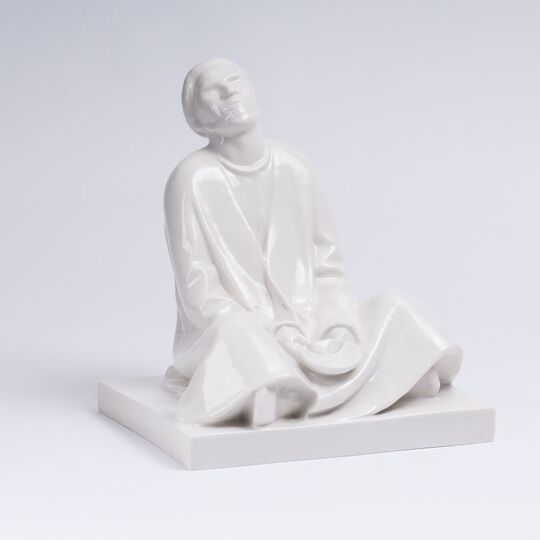Blind Beggar
Ernst Barlach (Wedel/Holst. 1870 - Rostock 1938)

Lot-No. 787
Designed in 1906, first moulded in 1913 at the Schwarzburger Werkstätten Unterweißbach, made 1995. Porcelain, white. On the underside embossed stamp 'Schwarzburger Werk-stätten für Porzellankunst' and embossed lacing fox, stamped model no. 'U61', on the plinth 'lithographic' sign. 'E. Barlach'. H. 24,1 x w. 24 cm x d. 20,5 cm. - Literature: WVZ Schult I/60; Klinge E., Ernst Barlach Porzellan, Leipzig 1995, p. 65. - German sculptor, writer and illustrator. B. studied 1888-95 at the Hamburg Kunstgewerbeschule and at the Dresden academy. He lived in Paris for two years before working as ceramicist in Hamburg, among others for the Altona manufactory Mutz. A journey to Russia became distinctive for his work. He first exhibited sculptures from Russian folk life at the Berlin secession in 1907. Subsequently he received many important public commissions. B. was very much pressurized by the Nazis, a. many of his works were seized or destroyed. Today he is appreciated as one of the most important sculptors of the 20th cent. Mus.: Hamburg (Ernst Barlach Haus), Nuremberg (Germanisches Nationalmuseum), Schwerin a. others. Lit.: Schult (cat. rais.) a. others.
Ernst Barlach: Blind Beggar
Ernst Barlach (Wedel/Holst. 1870 - Rostock 1938)
Blind Beggar
Lot-No. 787
Designed in 1906, first moulded in 1913 at the Schwarzburger Werkstätten Unterweißbach, made 1995. Porcelain, white. On the underside embossed stamp 'Schwarzburger Werk-stätten für Porzellankunst' and embossed lacing fox, stamped model no. 'U61', on the plinth 'lithographic' sign. 'E. Barlach'. H. 24,1 x w. 24 cm x d. 20,5 cm. - Literature: WVZ Schult I/60; Klinge E., Ernst Barlach Porzellan, Leipzig 1995, p. 65. - German sculptor, writer and illustrator. B. studied 1888-95 at the Hamburg Kunstgewerbeschule and at the Dresden academy. He lived in Paris for two years before working as ceramicist in Hamburg, among others for the Altona manufactory Mutz. A journey to Russia became distinctive for his work. He first exhibited sculptures from Russian folk life at the Berlin secession in 1907. Subsequently he received many important public commissions. B. was very much pressurized by the Nazis, a. many of his works were seized or destroyed. Today he is appreciated as one of the most important sculptors of the 20th cent. Mus.: Hamburg (Ernst Barlach Haus), Nuremberg (Germanisches Nationalmuseum), Schwerin a. others. Lit.: Schult (cat. rais.) a. others.


